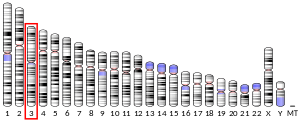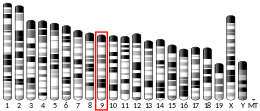IHPK1
Inositol hexakisphosphate kinase 1 is an enzyme that in humans is encoded by the IP6K1 gene.[5]
This gene encodes a protein that belongs to the inositol phosphokinase (IPK) family. This protein is likely responsible for the conversion of inositol hexakisphosphate (InsP6) to diphosphoinositol pentakisphosphate (InsP7/PP-InsP5). It may also convert 1,3,4,5,6-pentakisphosphate (InsP5) to PP-InsP4. Alternative splicing occurs for this gene; however, the full-length nature of all transcript variants has not yet been described.[5]
References
Further reading
- Nagase T, Seki N, Ishikawa K, et al. (1997). "Prediction of the coding sequences of unidentified human genes. VI. The coding sequences of 80 new genes (KIAA0201-KIAA0280) deduced by analysis of cDNA clones from cell line KG-1 and brain". DNA Res. 3 (5): 321–9, 341–54. doi:10.1093/dnares/3.5.321. PMID 9039502.
- White KE, Econs MJ (1998). "Localization of PiUS, a stimulator of cellular phosphate uptake to human chromosome 3p21.3". Somat. Cell Mol. Genet. 24 (1): 71–4. doi:10.1007/BF02677496. PMID 9776982.
- Schell MJ, Letcher AJ, Brearley CA, et al. (1999). "PiUS (Pi uptake stimulator) is an inositol hexakisphosphate kinase". FEBS Lett. 461 (3): 169–72. doi:10.1016/S0014-5793(99)01462-3. PMID 10567691.
- Saiardi A, Erdjument-Bromage H, Snowman AM, et al. (2000). "Synthesis of diphosphoinositol pentakisphosphate by a newly identified family of higher inositol polyphosphate kinases". Curr. Biol. 9 (22): 1323–6. doi:10.1016/S0960-9822(00)80055-X. PMID 10574768.
- Saiardi A, Caffrey JJ, Snyder SH, Shears SB (2000). "The inositol hexakisphosphate kinase family. Catalytic flexibility and function in yeast vacuole biogenesis". J. Biol. Chem. 275 (32): 24686–92. doi:10.1074/jbc.M002750200. PMID 10827188.
- Saiardi A, Nagata E, Luo HR, et al. (2001). "Identification and characterization of a novel inositol hexakisphosphate kinase". J. Biol. Chem. 276 (42): 39179–85. doi:10.1074/jbc.M106842200. PMID 11502751.
- Strausberg RL, Feingold EA, Grouse LH, et al. (2003). "Generation and initial analysis of more than 15,000 full-length human and mouse cDNA sequences". Proc. Natl. Acad. Sci. U.S.A. 99 (26): 16899–903. doi:10.1073/pnas.242603899. PMC 139241. PMID 12477932.
- Kamimura J, Wakui K, Kadowaki H, et al. (2004). "The IHPK1 gene is disrupted at the 3p21.31 breakpoint of t(3;9) in a family with type 2 diabetes mellitus". J. Hum. Genet. 49 (7): 360–5. doi:10.1007/s10038-004-0158-z. PMID 15221640.
- Gerhard DS, Wagner L, Feingold EA, et al. (2004). "The status, quality, and expansion of the NIH full-length cDNA project: the Mammalian Gene Collection (MGC)". Genome Res. 14 (10B): 2121–7. doi:10.1101/gr.2596504. PMC 528928. PMID 15489334.
- Rual JF, Venkatesan K, Hao T, et al. (2005). "Towards a proteome-scale map of the human protein-protein interaction network". Nature. 437 (7062): 1173–8. doi:10.1038/nature04209. PMID 16189514.
See also
This article is issued from
Wikipedia.
The text is licensed under Creative Commons - Attribution - Sharealike.
Additional terms may apply for the media files.




